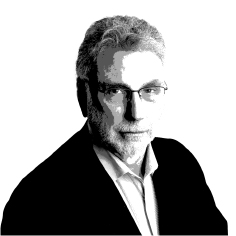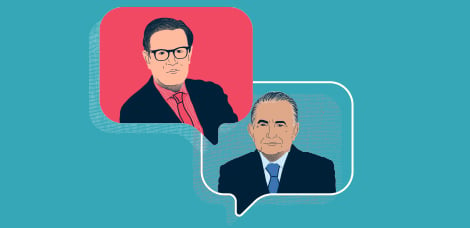-
TrendsDemocracyPolarizationSocial Media
-
SectorIT and Communications
-
CountriesUnited StatesGlobal
Martin Baron is one of the most esteemed American journalists of his generation. He’s been the editor of the Miami Herald, The Boston Globe, and, for nearly a decade, The Washington Post. Throughout his career, Baron demonstrated an incredible knack for breaking stories that reshaped the political and social landscape of the U.S. But more than that, he was at the helm during the digital transformation of these publications, guiding them toward profitability at a time when traditional journalists were reluctant to give up print, and owners and executives weren’t sure of the future business model.
Adding to this challenge, Baron led The Washington Post during a time of extreme political polarization in the U.S., which saw new heights under the ownership of Jeff Bezos, founder of Amazon, who bought the paper in 2014. Baron shares his experiences in his book Collision of Power: Trump, Bezos, and The Washington Post. We caught up with him via Zoom to discuss it all.
Q. A lot of your career has been focused on adapting newspapers to the digital age and dealing with budget cuts. Now that the subscription model is mainstream and many outlets are turning a profit, would you say that long transition period is over?
A. No. I think we will have to reevaluate our business model every six years or so, maybe even less. Two years ago, generative artificial intelligence (AI) was barely mentioned. Today, it’s a dominant topic, with discussions centered on its profound impact on society, journalism, and our business model.
Sometimes, we think that technology is advancing so rapidly that our only job is to keep up. But it’s more than that. We must embrace it, rethink how we structure and deliver information, what types of stories resonate, and pay close attention to how people want to consume news, which is constantly changing. Journalists need to get comfortable with being uncomfortable—that will be our permanent state.
We’ll need to reassess our business model every five years, maybe less. Just two years ago, no one was talking about generative AI, and now it’s the only thing anyone talks about.
Q. Have journalists adapted to these changes?
A. We know how to gather information. And now, we’re hiring more people with specific technical skills to assess what’s happening online and analyze it, especially regarding social media or how AI is being used. People who can detect and interpret trends and understand data.
But when it comes to storytelling, there’s a tendency in our profession to focus more on how things were done in the past than on how they should be done now. And that’s constantly evolving because the way people consume news and information in general is always changing. Journalists need to adjust their mindset, but many resist. It’s unsettling to have to change how we work every few years or less. But, unfortunately, that’s the reality. We’re much more like the tech industry now.
Q. And, like tech, we’ve become more dependent on metrics.
A. It’s essential to our business. We’re not just creating a product but maintaining a relationship with our readers. That’s led us to focus on understanding how people want to receive information and using metrics to gauge their satisfaction. What do they want? How can we deliver it better
Q. That was important for the business side— shifting to make readers the main revenue source rather than relying on advertising.
A. I’m not sure if it will be the primary source, but readers must be a significant source of revenue, far greater than in the past when we had no subscribers. While newspapers will continue to rely on advertising, events, and possibly other income sources, readers must be at the core.
Facebook has downgraded the relevance of news; it was once a major traffic source but now contributes very little. Similarly, as generative AI responses increasingly replace search results, Google will also drive much less traffic to media outlets. X, too, contributes only a small amount of traffic. News organizations will need to cultivate a direct relationship with readers, ideally encouraging them to pay for content as they did in the past and establish a direct connection similar to what existed before.
Q. Beyond technological shifts, media outlets have also lost credibility. Is that because many people think they’re biased, driven by ideology or other interests?
Media outlets must establish a direct relationship with their readers, ideally getting them to pay for information again, just like before. This would help foster a stronger connection.
A. The core issue goes deeper than bias—it has to do with the rise of the internet. Now, anyone can create a media outlet. Anyone can become a broadcaster or podcaster. The barriers to entry are essentially zero. Often, people gravitate toward sources on social media that reinforce their preexisting views, which can sometimes include conspiracy theories.
There is always someone out there who claims there is a conspiracy. Someone who, for personal, political, or commercial reasons, is deliberately spreading false information. That wasn’t the case in the past. Today, the challenge for reputable media is to distinguish themselves by making it clear that their central purpose is to verify information. We have a dedicated staff committed to the verification process regardless of their personal beliefs.
Q. That’s a tough process.
A. But if we don’t, we’ll end up as another partisan player in the political arena. And that’s not a path to long-term success. It definitely takes work. Many people want us to take sides—to be part of the partisan process. But I believe a significant portion of society still values having an independent referee of facts.
Q. Especially in this polarized climate. Is this political polarization really different from what has always existed in democracies?
A. I believe so. However, there are some key differences from the past. The most important thing is that, in the past, we disagreed on policy solutions, but we mostly agreed on a common set of facts. We agreed on what constituted objective reality, even if we disagreed with the policies. Today, we don’t share a common set of facts. In fact, it’s worse—we can’t even agree on determining what is a fact.
In the past, we used education, knowledge, experience, and especially evidence—what we could see with our own eyes and hear with our own ears—to establish objective reality. Today, all of that has been devalued. It’s a dangerous environment for journalism, for sure, but also for democracy and society at large. We’ve seen this in politics and in health and science, especially during the pandemic and since then.
Q. In your book, you seem relatively optimistic about the future of journalism and communication, even though politics is going through a rough patch.
A. Yes, I like to stay optimistic. We need to succeed, and I don’t know anyone who’s been successful while expecting to fail. We’ve faced tough times before and made it through. And we’ve reinvented ourselves as a profession. We need to keep doing that.
However, our future is closely tied to democracy. There can’t be a free and independent press without democracy, but democracy also can’t exist without a free and independent press. As long as democracy is alive, society will need to know what’s happening in their communities and countries—that’s the role of the press. I believe people will come to understand the difference between verified information and unverified information—the difference between professional journalism and someone who just started posting online yesterday without the resources to do any fact-checking. I’m optimistic as long as we keep doing our job.
There can be no democracy without a free and independent press. However, there can also be no free and independent press without democracy.

Martin Baron is one of the world’s most renowned journalists, celebrated for his role as editor of The Boston Globe (2001–2012), where he led the Pulitzer-winning Spotlight investigative team in 2003. This story was later adapted into the Oscar-winning film Spotlight in 2015. Martin began his journalism career in 1976 at The Miami Herald and worked at The Los Angeles Times and The New York Times before returning to The Miami Herald in 2000. He became executive editor of The Washington Post in 2013 and worked there until his retirement in 2021. Fluent in Spanish, he holds a BA and an MBA from Lehigh University. [US]



